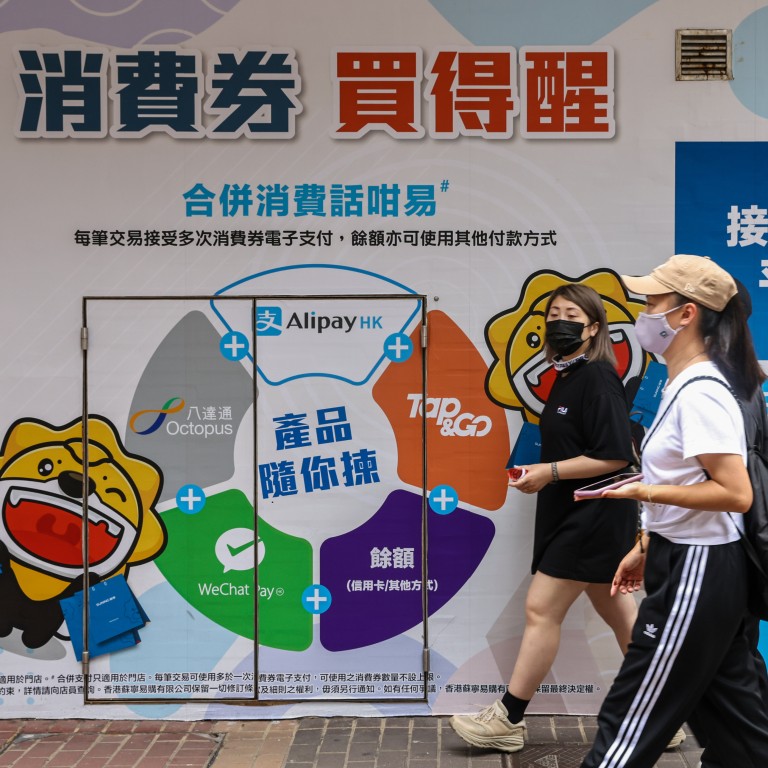
Utility bills, hospital visit records can be used as proof of residency in Hong Kong for appeals over HK$5,000 voucher scheme, finance chief says
- Financial Secretary Paul Chan says applicants for consumption voucher scheme can use documents such as salary payment slips, rental tenancies as proof of residency
- Those who cannot provide such documents can also state their reasons in their appeals, to be considered at authorities’ discretion
The government will accept documents such as utility bills and hospital visit records as proof of residency from Hongkongers appealing the rejection of their application for the latest handout of HK$5,000 (US$637), the financial chief has said, after the denial of nearly a quarter of a million people sparked an outcry.
Writing on his blog on Sunday, Financial Secretary Paul Chan Mo-po said applicants making an appeal could also use bank or tax returns statements, salary payment slips, rental tenancies and phone bills as proof they lived in the city full time.
Those who could not provide the documents could also state their reasons in their appeals, and authorities would consider the applicant’s actual situation at their discretion, he said.

“We will deal with it in a relaxed manner and as conveniently as possible for the public,” Chan said. “If residents are now living in Hong Kong, they only need to provide simple proof to qualify for the consumption voucher.”
The government is expected to hand out the second tranche of consumption vouchers on August 7 to about 6.3 million eligible permanent residents and new arrivals from mainland China, plus about 300,000 others eligible for residency, such as people with specialist qualifications, entrepreneurs and students. But people with plans to migrate are disqualified. The handouts are aimed at stimulating the local economy during the Covid-19 pandemic.
About 240,000 people were ruled ineligible for the latest round of e-vouchers because they were considered as having “permanently left Hong Kong” after they had applied to withdraw their Mandatory Provident Fund (MPF) contributions. Crowds flooded a consumption voucher service centre in Mong Kok on Friday to appeal against the ruling.
“Quite a number of those people should have emigrated overseas. Allowing them to get the vouchers would cost the government hundreds of millions of public funds,” he said, while revealing about 30,000 applicants had made an appeal by Saturday evening.
Hong Kong utility bill may be enough to appeal rejection for HK$5,000 handout
Confirming an earlier Post report, Chan said those who hoped to appeal under the simplified process could download the form via the consumption voucher website and file applications by email, mail or personally hand them to eight centres within 14 days.
The financial secretary added that he understood there were voices urging the government to confirm whether those who withdrew their MPF contributions early were in fact living in the city before rejecting their applications, but argued authorities faced restrictions in examining residents’ personal information protected by various laws.
“We will continue considering different opinions in society, and take lessons from the experience of issuing the consumption voucher this time,” he said.
Many welcomed the new arrangement, which they said would help more people benefit from the cash assistance, but noted some who could be rejected.
What you need to know about second batch of Hong Kong consumption vouchers
Sze Lai-shan, deputy director of NGO Society for Community Organisation, said about 500 underprivileged residents with whom it worked had their applications for the handout refused because they had withdrawn their MPF.
Some took their retirement money when they decided to settle on the mainland, only to later return to Hong Kong.
She said the government’s new arrangement would make it easier for them to prove they lived in the city, but many residents still did not know how to make an appeal and had flooded the NGO with calls for help. Others could not provide any of the required documents.
“It should be the responsibility of the government to confirm whether a resident lives in Hong Kong or not,” Sze said, urging authorities to examine residents’ entry and exit records as proof.
“The government should not burden residents with the complicated procedure and deny them financial assistance.”

